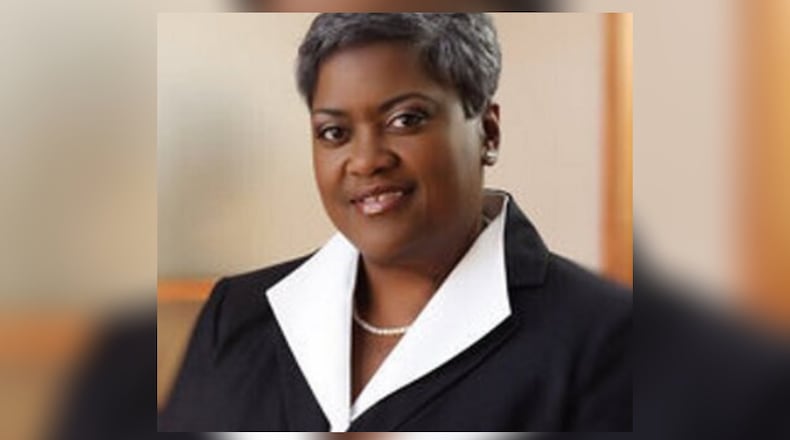She used to have a 10-carat diamond ring and a Rolls-Royce. Now Shelitha Robertson, an Atlanta lawyer and business owner once employed by the city as a police officer and attorney, is “dead broke” and facing prison.
Robertson was sentenced Friday to serve seven years and three months behind bars after she and another lawyer fraudulently obtained almost $15 million in Paycheck Protection Program funds. She cried upon hearing the sentence imposed by U.S. District Judge Steven D. Grimberg, as many of her family members and friends sat behind her in court.
“I’m dead broke,” Robertson had said in court hours earlier while being questioned about her assets. “My business is gone. My (law) license is gone. My assets are gone. The only thing I have left is my family and my faith in God.”
Robertson will get credit for the six months she’s spent in custody since December, when she was found guilty on three counts of wire fraud and single counts of money laundering and conspiracy to commit wire fraud.
Grimberg said Robertson, who will be almost 70 when she’s released from prison, had a leading role in the PPP fraud conspiracy also involving now-disbarred attorney Chandra Norton. The two lawyers, who used to be friends, conspired to get $14.9 million in loans meant for struggling businesses during the coronavirus pandemic, though they didn’t need the money.
Both Robertson and Norton had companies that secured multimillion-dollar water and sewer contracts with DeKalb County. They grossly exaggerated the number of people they employed to obtain millions of dollars in federal aid.
“It was her level of direction and confidence in being able to commit this level of fraud without being detected that instigated it in the first place,” Grimberg said of Robertson. “And the amount of loss – over $14 million – is just a staggering amount.”
Robertson used the approximately $7 million in loans that went to her businesses to buy jewelry, including a 10-carat diamond ring for $148,000, and to pay for vehicles, including a Rolls-Royce. She paid back the money, with interest, after a bank became suspicious and froze her account in May 2020.
Grimberg said it’s likely that Robertson will be liable, along with Norton, for paying the remaining $7.9 million in restitution. The judge gave prosecutors and Robertson’s attorneys 30 days to prepare for a restitution hearing.
Norton took a plea deal in November 2020 and cooperated with federal authorities in their case against Robertson, who was indicted in December 2022. Norton is due to be sentenced by Grimberg on Aug. 14 on a single count of wire fraud conspiracy.
At trial, Robertson blamed Norton for the fraudulent loan applications. Grimberg said the opinion he had formed about Robertson following the trial changed after hearing Thursday from her and her supporters.
Robertson said she was deeply sorry for the negative impact her conduct has had on her family, wife and community. She said she sold or transferred all her assets just before she was indicted in an effort to keep her business afloat so its employees could keep their jobs.
“I’m not that person that tries to take advantage of anybody or any situation,” she said. “I’ve owned up to what I’ve done.”
Friend Richard Ramey, owner of the iconic gay nightclub Atlanta Eagle, spoke in support of Robertson the day after the original location of his business was damaged by fire. Ramey said he met Robertson immediately after his bar was raided by police more than a decade ago, when she helped get several of his arrested employees out of jail.
“She never asked for anything,” he said. “She never asked for money. She never asked for recognition. She’s just helped me in so many different ways.”
The judge also heard from Robertson’s sorority sister, nephew and daughter, who each spoke about her generosity and leadership.
Robertson was also sentenced to three years of supervision upon release from prison.
Grimberg said those who defraud federal aid programs implemented when the country is in crisis threaten the future of such initiatives. He said the federal government estimates that more than 9% of PPP loan applications were fraudulent in some way.
“The victims are every single American taxpayer,” he said. “These types of offenses of government programs impact each and every one of us.”
About the Author
Keep Reading
The Latest
Featured



